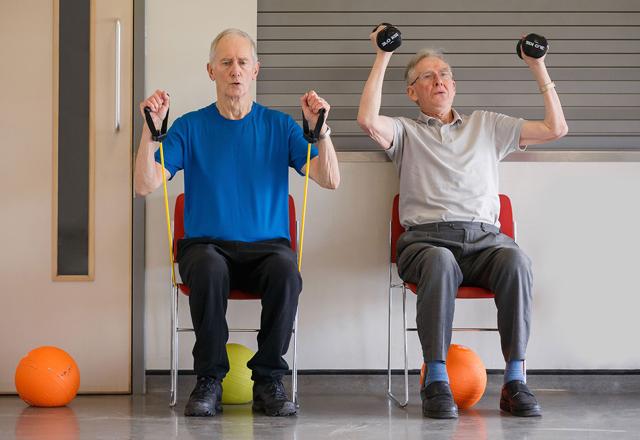Long-term exercise by older adults tied to lower risk of falls

Reuters
Older adults who have exercised regularly for at least a year may be less likely to experience falls or related injuries than their less active peers, a research review suggests.
Researchers analysed data from 40 clinical trials with a total of 21,868 adults who were 73 years old on average. All of the smaller trials randomly assigned some participants to do a variety of exercise programmes for at least 48 weeks while others joined a comparison group that did not exercise or, more often, an “active control” group that might exercise outside the context of the workouts being tested.
Participants assigned to the tested exercise programs for at least one year were 12 per cent less likely to fall and 26 per cent less likely to sustain injuries if they did fall than people who were not part of exercise interventions, the analysis found.
Exercise programs were also associated with a 16 per cent lower risk of fractures.
“Exercising continuously in time brings health benefits even in late life, including for people with chronic conditions,” said lead researcher Philipe de Souto Barreto of Toulouse University Hospital in France.
A variety of factors can make falls more likely, and exercise may help address many of these issues at once, Barreto said by e-mail. Workouts may strengthen leg muscles, improve balance and coordination while walking, and help reduce the risk and severity of osteoporosis, or diminished bone density that can make fractures more likely when people do fall.
The analysis did not find a connection between exercise and a lower risk of multiple falls, hospitalisations or premature death, researchers report in JAMA Internal Medicine.
Most of the studies in the analysis were done in Europe or the United States, and several of the trials examined the effects of exercise in people with chronic health problems like dementia or heart disease.
In most of the trials, researchers tested a combination of aerobic exercise and strength training and provided participants with at least some supervised workouts.
One limitation of the analysis is that several of the small trials included in the study did not clearly report what proportion of participants completed exercise programs as directed, the study authors note. It is also possible that longer trials would be needed to understand the connection between routine workouts and the risk of fractures, researchers also point out.
Even so, a wide range of exercise programmes from strength training to tai chi have long been linked to a lower risk of falls in older adults, said coauthor of an accompanying editorial Dr Seth Landefeld of the University of Alabama at Birmingham.
“What is new is that this study focused on studies of exercise interventions for more than one year,” Landefeld said by e-mail.
“Exercise about two to three times weekly for a total of about three hours weekly reduces the risk for falls and the risk of injury from a fall,” Landefeld added.
Latest News
 King orders holding parliamentary elections in accordance with law, checks on electoral commission’s preparations
King orders holding parliamentary elections in accordance with law, checks on electoral commission’s preparations- N. Macedonia starts elections that could decide stalled EU talks
 US Senate passes bill for aid to Israeli Occupation, Ukraine, Taiwan
US Senate passes bill for aid to Israeli Occupation, Ukraine, Taiwan Safadi discusses support to Syrian refugee with DRC
Safadi discusses support to Syrian refugee with DRC Israeli Occupation aggression on Gaza enters 200th day
Israeli Occupation aggression on Gaza enters 200th day
Most Read Articles
- US president signs bill to provide new aid for Ukraine
- Prime minister directs government to support IEC ahead of upcoming elections
- Iran cuts Syria presence after strikes blamed on Israel —monitor
- Palestinian prime minister, Jordanian ambassador discuss humanitarian efforts in Palestine
- US Supreme Court seems split on Idaho abortion ban
- UAE announces $544m for repairs after record rains
- Four dead as floods wreak havoc in Kenyan capital
- Vaccines saved at least 154 million lives in 50 years — WHO
- Germany nudges up growth forecast, ailing economy at 'turning point'
- Israel pummels Gaza after US Congress approves military aid